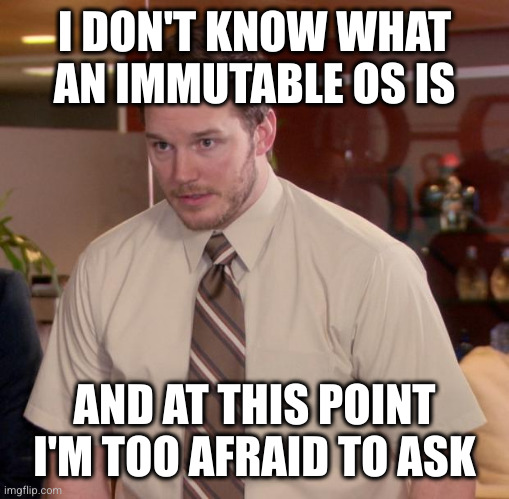An immutable OS is useful for things like an alarm clock, where if you accidentally muted the sound system, you could oversleep. There's an obvious downside if you're someone that watches porn on your alarm clock computer, but sometimes compromises must be made.
linuxmemes
Hint: :q!
Sister communities:
- LemmyMemes: Memes
- LemmyShitpost: Anything and everything goes.
- RISA: Star Trek memes and shitposts
Community rules (click to expand)
1. Follow the site-wide rules
- Instance-wide TOS: https://legal.lemmy.world/tos/
- Lemmy code of conduct: https://join-lemmy.org/docs/code_of_conduct.html
2. Be civil
- Understand the difference between a joke and an insult.
- Do not harrass or attack members of the community for any reason.
- Leave remarks of "peasantry" to the PCMR community. If you dislike an OS/service/application, attack the thing you dislike, not the individuals who use it. Some people may not have a choice.
- Bigotry will not be tolerated.
- These rules are somewhat loosened when the subject is a public figure. Still, do not attack their person or incite harrassment.
3. Post Linux-related content
- Including Unix and BSD.
- Non-Linux content is acceptable as long as it makes a reference to Linux. For example, the poorly made mockery of
sudoin Windows. - No porn. Even if you watch it on a Linux machine.
4. No recent reposts
- Everybody uses Arch btw, can't quit Vim, and wants to interject for a moment. You can stop now.
Please report posts and comments that break these rules!
Important: never execute code or follow advice that you don't understand or can't verify, especially here. The word of the day is credibility. This is a meme community -- even the most helpful comments might just be shitposts that can damage your system. Be aware, be smart, don't fork-bomb your computer.
I used to have a clock that had a USB port for pictures to display. This may be a larger problem than we're aware of
Root directories are no go unless you specifically ask to change them. If you're developing it's a lot easier if you can depend on all the programs and dependencies to be the same in the same directories.
It's like getting a system how you like it and burning it to dvd.
The changes from distro to distro are how they handle your changes. More specially how do we undo changes if it goes wrong
There are a few ways to handle changes some swap from image A to image B like vanilla os
Some just use their rollback image tech they have in standard distros like opensuse aeon .
Some like fedora silverblue use images that pull from a repo if you've used docker this might seem familiar.
From silverblue you have ublue project that really pushes the container ethos your distro becomes a host to ask sorts of containers kinda like proxmox.
The end of the day it's like distros a collection a packages with the essential stuff locked in a non writeable directory.
I hope this is clear sorry I'm dyslexic and it's bedtime
Then an immutable OS is the right OS for you!
An OS that has reached perfection and doesn’t need changes anymore. Examples are Hannah Montana Linux, Temple OS, MS-DOS, Novell Netware.
Every time I think I've managed to erase NetWare from my brain, someone has to drag it back up angry fist-shaking
We need you to fix the thinnet again.
Freedos is better than ms-dos because it's open source, it has fat32 support and everything generally works better. I use Freedos btw.
Is it immutable, though?
No
There you go.
(”obviously“ sarcasm)
An immutable OS is fixed and mounted non-writable. Every update you get, every program you install is handled on top of it via containers or filesystem overlays so the underlying OS is untouched. Basically the same concept you know from smartphones or other devices with a "reset to factory settings" function. No matter how hard you screw up your system, you can always reset to the base OS, either by granulary deactivating things installed on top, or by a reset to the working base OS.
So how are OS updates handled, they are not written into the main OS?
They are written but don't replace something in the read-only OS. They are just overlayed, so once removed the original is still there. How they do it differs. There are actual overlay filesystems for the job, or some use btrfs where all subvolumes behave mostly like virtual partitions (and copies of a subvolume only take space for changes of the original).
That's interesting. Thanks.
Mutations are bad. See cancer.
Mutations are also good, see evolution.
And Miles Davis
Mutations are also bad, see the absolute fuckwaffle that used to be Windows NT (or Godzilla or something).
Mutations are also good, see any piece of software with a version higher than 1.0, or any project that was forked.
Looks at GTK 3
Not convinced.
You see, some operating systems are mostly operated by sound. If you mute them, they stop working. So it makes sense that you can't mute them.
The penguin must scream!
My mother in law runs on such an operating system.
That's why processors are using GigaHertz to work
